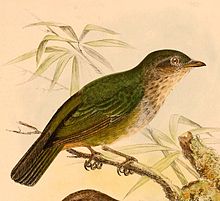The hylocitrea (Hylocitrea bonensis), also known as the yellow-flanked whistler or olive-flanked whistler, is a species of bird that is endemic to montane forests on the Indonesian island of Sulawesi.[3] It is monotypic within the genus Hylocitrea, and has traditionally been considered a member of the family Pachycephalidae, but recent genetic evidence suggests it should be placed in a monotypic subfamily of the family Bombycillidae,[4] or even its own family, Hylocitreidae.[1] A 2019 study[5] found it to be a sister group to a clade containing the hypocolius (Hypocoliidae) and the extinct Hawaiian honeyeaters (Mohoidae), with the clade containing all three being a sister group to the silky-flycatchers (Ptiliogonatidae). The divergences forming these families occurred in the early Miocene, about 20-23 million years ago.[5][6]
| Hylocitrea[1] | |
|---|---|

| |
| Scientific classification | |
| Domain: | Eukaryota |
| Kingdom: | Animalia |
| Phylum: | Chordata |
| Class: | Aves |
| Order: | Passeriformes |
| Superfamily: | Bombycilloidea |
| Family: | Hylocitreidae Fjeldsa, Ericson, Johannson, & Zuccon 2015 |
| Genus: | Hylocitrea Mathews, 1925 |
| Species: | H. bonensis
|
| Binomial name | |
| Hylocitrea bonensis (Meyer & Wiglesworth, 1894)
| |
References
edit- ^ a b Gill, F; D Donsker, eds. (2011). "Waxwings to Swallows". IOC World Bird Names (version 2.9). Archived from the original on July 24, 2011. Retrieved 17 August 2011.
- ^ BirdLife International (2016). "Hylocitrea bonensis". IUCN Red List of Threatened Species. 2016: e.T103867190A94017773. doi:10.2305/IUCN.UK.2016-3.RLTS.T103867190A94017773.en. Retrieved 16 November 2021.
- ^ Boles, W. E. (2007). Yellow-flanked Whistler (Hylocitrea bonensis). pp. 411 in: Del Hoyo, J.; Elliot, A., & Christie D. eds. (2007). Handbook of the Birds of the World. Vol. 12. Picathartes to Tits and Chickadees. Lynx Edicions, Barcelona. ISBN 978-84-96553-42-2
- ^ Spellman, G.A.; Cibois, A; Moyle, RG; Winker, K; Keith Barker, F; et al. (2008). "Clarifying the systematics of an enigmatic avian lineage: What is a bombycillid?". Molecular Phylogenetics and Evolution. 49 (3): 691–1044. doi:10.1016/j.ympev.2008.09.006. PMC 2627281. PMID 18824237.
- ^ a b Oliveros, Carl H.; Field, Daniel J.; Ksepka, Daniel T.; Barker, F. Keith; Aleixo, Alexandre; Andersen, Michael J.; Alström, Per; Benz, Brett W.; Braun, Edward L.; Braun, Michael J.; Bravo, Gustavo A.; Brumfield, Robb T.; Chesser, R. Terry; Claramunt, Santiago; Cracraft, Joel (2019-04-16). "Earth history and the passerine superradiation". Proceedings of the National Academy of Sciences. 116 (16): 7916–7925. Bibcode:2019PNAS..116.7916O. doi:10.1073/pnas.1813206116. ISSN 0027-8424. PMC 6475423. PMID 30936315.
- ^ Lerner, Heather R.L.; Meyer, Matthias; James, Helen F.; Hofreiter, Michael; Fleischer, Robert C. (2011-11-08). "Multilocus Resolution of Phylogeny and Timescale in the Extant Adaptive Radiation of Hawaiian Honeycreepers". Current Biology. 21 (21): 1838–1844. Bibcode:2011CBio...21.1838L. doi:10.1016/j.cub.2011.09.039. ISSN 0960-9822. PMID 22018543.
